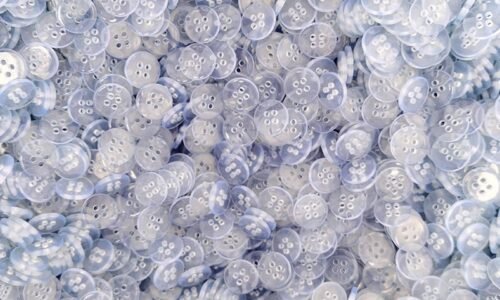Introduction to Polyester Buttons
Polyester buttons have firmly established themselves as a staple in the fashion and garment industry due to several key attributes that make them highly desirable. Primarily, their durability is noteworthy; polyester, being a resilient material, withstands everyday wear and tear effectively. This longevity translates into a cost-effective solution for manufacturers and consumers alike, as it reduces the need for frequent replacements. Compared to alternative materials, polyester buttons are also financially viable, offering a balance between quality and affordability that appeals to a broad spectrum of markets.
The versatility of polyester buttons further contributes to their widespread usage. Available in an extensive array of colors, sizes, and designs, these buttons cater to diverse aesthetic and functional requirements. From casual wear to formal attire, and even specialized garments like uniforms and outerwear, polyester buttons provide both practical functionality and design flexibility. This adaptability ensures they remain a fundamental component in various clothing sectors.
Globally, the demand for polyester buttons continues to soar, driven by their practical benefits and the proliferation of fast fashion trends. The global fashion industry’s incessant demand for cost-efficient yet durable components accentuates the importance of polyester buttons. India, in particular, has emerged as a pivotal player in this market. As a major hub for top button manufacturers in India, the country supplies a substantial portion of the world’s polyester button requirements. The presence of numerous polyester button suppliers in India enables garment manufacturers to buy shirt buttons in wholesale in India efficiently, leveraging both competitive pricing and quality assurance.
With India’s established manufacturing infrastructure and expertise in polyester button production, the country is well-positioned to meet the growing international demand. Consequently, the polyester button industry in India represents not only a significant segment of the domestic market but also a crucial link in the global supply chain.
Key Regions for Polyester Button Manufacturing in India
India boasts several prominent regions that have established themselves as leading hubs for polyester button manufacturing. Among these, Delhi, Gujarat, and Tamil Nadu are noteworthy for their significant contributions to the industry. Each of these regions has a unique historical and economic context that has fostered their development as key centers for the manufacturing of polyester buttons.
Delhi, the capital city, holds a prominent place in the polyester button manufacturing sector. Historically, its strategic location and access to vast markets have made it a conducive environment for numerous industries, including button manufacturing. Over the years, a well-developed infrastructure and an abundance of skilled labor have further cemented Delhi’s status as a key player. The region’s capacity to cater to both small-scale and large-scale production requirements makes it a crucial part of India’s button manufacturing landscape.
Gujarat is another major region contributing to the polyester button industry. Known for its entrepreneurial spirit and robust industrial policies, Gujarat has developed an extensive network of polyester button suppliers in India. The state’s favorable business environment, coupled with government incentives and support, has catalyzed the growth of numerous button manufacturing units. Infrastructure improvements, such as better transportation networks and modern manufacturing facilities, have also facilitated the region’s rise as a significant hub for producing polyester buttons.
Tamil Nadu, specifically cities like Chennai and Coimbatore, is renowned for its rich history in textile and garment manufacturing. Leveraging this historical expertise, Tamil Nadu has transitioned smoothly into polyester button manufacturing, benefiting from its existing skilled labor pool and advanced production infrastructure. The state’s long-standing tradition in textiles seamlessly integrates with the button manufacturing industry, enabling it to thrive as a key supplier in the country. Additionally, the presence of educational institutions and training centers focused on textile engineering ensures a continuous supply of skilled workers to support the industry.
Recent trends and innovations in these regions also highlight their proactive approach to adopting advanced manufacturing techniques and sustainable practices. Whether it’s through the integration of automation technologies or the use of eco-friendly materials in button production, these regions underscore India’s commitment to staying at the forefront of global trends in the textile accessory market.
Manufacturing Process and Technological Advancements
The manufacturing process of polyester buttons, overseen by some of the top button manufacturers in India, begins with the procurement of raw materials. Polyester resin, the primary material, is meticulously selected to ensure quality and durability. The process initiates with the melting of this resin at high temperatures, transforming it into a malleable liquid state.
Following this, the liquid polyester is poured into molds designed to form buttons of various shapes and sizes. This stage, known as injection molding, is critical for defining the initial structure of the buttons. Modern machinery has revolutionized this process, enhancing precision and uniformity in button production.
Post molding, the buttons undergo a cooling phase, allowing them to solidify. They are then transferred to the next stage for trimming and shaping, where any excess material is removed. This step ensures the buttons retain smooth edges and consistent shapes. Subsequent to shaping, the buttons are polished using sophisticated polishing machines, which impart a glossy finish, elevating their aesthetic appeal.
Technological advancements have significantly impacted this industry. Automation has streamlined the production line, boosting efficiency and reducing manual intervention. Automated inspection systems now play a crucial role in quality control, detecting imperfections at early stages and ensuring only top-notch products leave the factory floor. These systems employ optical sensors and imaging technologies to scrutinize buttons for defects, sustaining the high-quality standards expected from polyester button suppliers in India.
Eco-friendly practices are also gaining prominence among manufacturers. The adoption of recyclable materials and energy-efficient machinery highlights a growing commitment to sustainability. Waterless dyeing technologies, which significantly reduce water consumption, are one such innovation. Furthermore, the integration of renewable energy sources in production facilities underscores the industry’s move towards greener manufacturing processes.
Maintaining quality standards is paramount, especially for firms aiming to solidify their reputation and meet the expectations of clients looking to buy shirt buttons in wholesale in India. Rigorous adherence to quality controls and continual improvements in manufacturing technologies ensure that Indian polyester buttons remain competitive in both domestic and international markets.
Challenges and Future Prospects of the Polyester Button Industry in India
The polyester button manufacturing industry in India faces a multitude of challenges, primarily stemming from intense competition with international markets. Indian manufacturers must contend with low-cost producers in countries like China, which have significantly higher production capacities and more advanced technological infrastructure. This competitive landscape puts pressure on local manufacturers to reduce costs without compromising quality, a difficult balancing act that can strain resources and operational efficiency.
Another persistent challenge is the availability of raw materials. Polyester button suppliers in India often encounter supply chain disruptions, impacting their ability to maintain consistent production levels. Fluctuating prices of raw materials further complicate the scenario, making it difficult for manufacturers to forecast costs and manage their budgets effectively. The reliance on imported raw materials also exposes the industry to global market volatility, heightening the risk of supply shortages or price hikes.
Maintaining stringent quality standards is also a critical issue. As customers demand higher-quality finished products, manufacturers are required to invest in advanced manufacturing techniques and rigorous quality control processes. This is particularly crucial for those looking to buy shirt buttons in wholesale in India. Failure to adhere to these high standards can result in lost business and damage to reputations.
Government policies play a significant role in shaping the landscape of the polyester button industry. Policies that encourage investment in manufacturing infrastructure, provide tax incentives, or support export initiatives can create a more favorable environment for local businesses. Conversely, regulatory hurdles and bureaucratic inefficiencies can inhibit growth and innovation.
Looking ahead, the future prospects for the polyester button industry in India appear promising, but contingent on the adoption of new technologies and innovative practices. Automation and digitalization could enhance production efficiency and quality control, enabling manufacturers to compete more effectively on a global scale. Furthermore, exploring sustainable and eco-friendly materials could open up new market segments and appeal to environmentally conscious consumers.
Overall, there is significant potential for growth and expansion, particularly in international markets. By leveraging technological advancements and adhering to stringent quality standards, Indian polyester button manufacturers can enhance their global presence and build a robust, resilient industry.


